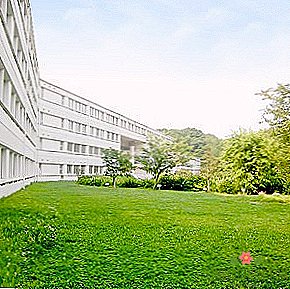How I moved to Scotland - to study Poland
In 2015 I graduated from undergraduate degree. in Russia in the specialty "Political Science". I liked to study, and therefore at the beginning of the fourth year I was thinking about how to continue my studies. By that time my scientific interests had finally formed, and I decided that I wanted to study Central and Eastern Europe, especially Poland.
There were several options in Russia, but none of them meant scholarships for which one could live, but I wanted to devote most of my time to study, not to work. Then I began to look for options in Europe. So I accidentally stumbled upon the master's program "Russia, Central and Eastern Europe" at the University of Glasgow in Scotland. It was an interdisciplinary program, which, judging by the description, should be interesting and political scientists, and international affairs, and regionalists. In addition, it turned out that this is a double degree program and the second year can be spent in one of the partner universities of Central and Eastern Europe, among which was the best university in Poland.
On paper, everything looked as if this program was specially written for me. In December 2014, I submitted the documents, a couple of days I received an invitation, and in March 2015 I learned that I won a scholarship.

Arrival
It was easy to act. All that was required was to e-mail a standard set of documents: a motivation letter, recommendations and assessments. There were no tests, no exams or no interviews, so the flow was calm. As it turned out, the whole of Russia is usually given two or three places, but then I, to my composure, did not know about it.
Upon admission to universities in the UK you need to understand that if you are ready to pay for your education yourself and do not submit documents to Oxford or Cambridge, you will most likely be taken. Therefore, the main problem is not the admission to a British university, but the search for funding. Because of this, everything usually happens this way: first of all, you will find out if you are being taken to a university, and the answer about funding may come in three or four months. It is important not to rejoice ahead of time: it can be quite unpleasant.
University
The University of Glasgow is incredibly beautiful. This is one of the oldest universities in the UK, so when you are at a lecture in the tower with a spiral staircase or when you find yourself during a break in the courtyard, topped with arcades, you will definitely feel like a student of Hogwarts. The university is visited annually by an incredible number of tourists.
There is always something to do besides studying: the choice of an insane number of closed clubs and communities, starting with Russian language lovers and ending with vodka lovers. In addition, on campus there is a multi-storey gymnasium in which everything can be found: from the pool to golf and fencing. In each building of the university there are several student cafes and bars. Many of them were organized by the students themselves - for example, last year they managed to get money from a well-known alcohol company for the repair and expansion of one of the premises. So that you can better present the student self-government at the University of Glasgow, I would only add that from 2014 to 2017, the representative of the students in front of the university management (the so-called student rector) was Edward Snowden.
At first, I was shocked by the segregation of undergraduate students and subsequent stages: some university bars are open only for masters, graduate students and teachers, there are even separate floors in libraries and entire rest rooms in buildings with auditoriums to which entry to bachelors is prohibited. However, all this ends with the fact that groups of bachelors are constantly spinning at the doors to the cherished rooms, who are trying to rush past the entrance or openly ask someone from undergraduates to take them inside. In my opinion, all this works more likely to create students' desire to continue learning at any cost, regardless of how much they really need it (this is well described in the 2014 film "Ivory Tower").
The educational process at the University of Glasgow is not at all similar to the Russian one: for ten thousand pounds sterling per year (the minimum cost of training in the magistracy in the UK for students from countries outside the European Union) you are taught only two or three couples per week. Everything else is self-study: student status gives you access to the library (and it’s really great in Glasgow), where, as expected, you need to master most of the subject. In addition, individual consultations with teachers are possible by agreement.
For the first six months of my master's program "Russia, Central and Eastern Europe", we studied two compulsory subjects: research methods and a general course on Russia, Central and Eastern Europe. Each lecture at both courses was conducted by a new teacher, and for us it was a kind of "talent show": we had to choose under whose leadership and on what topic to write a diploma. In addition, it was obligatory to study regional languages (which include Russian, Polish, Hungarian and Czech). In addition, small seminars were organized at which we discussed our written work, plans for a diploma, criticized each other's work and gave advice. In the second half of the year, we chose objects ourselves; In many courses, each student had to conduct a class for fellow students.
If we talk about who mostly goes to study in Scotland, then these are Americans (especially those who want to study in Europe, but are not eager to learn foreign languages, and those for whom studying in the United States is quite expensive); Chinese (mostly children of rich parents who were not taken to study in the USA because of a low score, and therefore they had to go to the UK; in my university some courses included up to 90% of students from China), students from the European Union, as for them, education in Scotland is free. Interestingly, EU citizens can study in Scotland for free, while the British, Irish or Welsh cannot.
At the University of Glasgow, few people observe the official business style. Go to what will have: leggings with emblems of the Sports Association of the University of Glasgow - routine. Pillows, homemade soups are brought to the library: many come here to the opening to take a free place, and leave at two in the morning. Students often leave a part of things in the library (including a computer) at the workplace, go to a lecture, go to the gym, go to the grocery store, and then return.

Adaptation
Before leaving, all and sundry frightened me with a Scottish accent. In reality, there is no big problem: firstly, most of the teachers are not Scottish, and secondly, there is a stereotype in Scotland that a strong accent is perceived as a sign of provincialism, so parents often invest in children’s education so that their emphasis is less zametnym I encountered a strong Scottish accent, when it is impossible to understand a word, only a couple of times.
Therefore, I would advise those who still have to go to Scotland to think not about how to understand the Scottish accent, but about how to generally pump their level of English before the trip, because learning English in Europe and learning from English in the UK, where the majority are native speakers, are different things. On my program, I easily shot points for the missed article with the wording "from your essay it is clear that you are not a native speaker", despite the fact that I studied at an international program and it was obvious that many are not native English speakers. And in general, if you speak poorly, slowly or uncertainly in English, they will smash you and give the floor to another.
Also before the trip you should read about how to understand what the meaning is behind, at first glance, polite phrase or approval. The British primness is, of course, a stereotype, but not without foundation: well, my teacher never said directly that the lesson was over. Usually she took a pause, and then said something like: "So politely of you is still here."
Some stiffness of the academic community is more than compensated by ordinary people. I didn’t have a day for a stranger on the street not to speak to me: the Scotchmen start a conversation very easily in the queue for coffee, in the transport, in the park, in the store. Thanks to this, I found many friends in Scotland, and also learned a lot of interesting things about Russia. For example, some Scots were confident that Russia is in the EU.
What many were really not ready for was the lack of central heating: in some apartments, in principle, there were no batteries. Some of my classmates learned about this, having already entered the apartment after signing a contract for a year. Since the house was old, and besides with high ceilings, it was not easy to heat the apartment with heaters. They saved themselves as best they could: from ironing the bed with an iron before bedtime and laying it on themselves with hot water bottles and overnight stays in the library, where it was warm. I, fortunately, lived in a dorm, where there was central heating. But they had to pay for the room at least one and a half times more than for the apartment. This is the specificity of hostels in the UK: they are always more expensive than apartments, it is believed that the hostel is for those who do not want to make an effort to find housing.
As for the weather, then, on the advice of the students from the previous graduation, before the trip I was bought with waterproof outerwear and shoes. Not that they were not useful to me - everything was in place. But, in my opinion, the fears are exaggerated: there were no more rainy days and flood threats than in my native St. Petersburg, and there were plenty of sunny days, and by the end of May I was already sunburnt. In addition, because of the Gulf Stream everything blooms much earlier than in continental Europe.
Glasgow as a whole turned out to be a very lively city: bars and pubs, parks and gardens, where office workers come during the day to eat lunch, and in the evening to fry meat on the public barbecue grills set by the city; museums and theaters, including a museum designed by Zaha Hadid, world-class music venues. All this is not surprising for a city where 40% of the population is under 29 years old. But at the same time, living in Glasgow is very comfortable, and here, in my opinion, it is easy to keep a balance between work and personal life. In addition, I never had to worry about their safety. Of course, my positive experience is related to the fact that I lived and studied in the West End, a very prosperous area centered around the university. But in Glasgow there are still places with a high level of crime, but they are becoming less and less. And although a few years ago the city was recognized as the criminal capital of Britain, in a couple of years it was possible to reduce the crime rate by 50% - an impressive result.
What's next?
Now I am studying at a university in Poland, which is implied by a double degree program - in many respects for the sake of this I applied for a program in Glasgow. But so far all comparisons between Scotland and Poland are not in favor of the latter.
After graduation, I would love to stay in Scotland. I manage to get on with the locals, during the course of my studies I managed to acquire contacts and feel Scottish history and modern politics. In Scotland, nature and large modern cities are harmoniously combined: I like living in a big city to have the opportunity to take public transport and in an hour find myself in a national park or on a rocky cliff by the sea. In addition, the Scots are really open to migrants and, in my experience, they receive foreigners quite warmly.
But to stay in Scotland is not so easy. Student visa gives an additional four months after graduation to find a job. But even if you are successful in finding a job, it’s not a fact that you can get a work visa: your position must meet certain requirements, you should receive a salary of at least twenty-five thousand pounds per year, the employer must provide you with a sponsorship letter, and a list of organizations that entitled to issue such a letter, small. Although, of course, nothing is impossible.
Photo: Claudio Divizia - stock.adobe.com, Talya - stock.adobe.com, Gordon Saunders - stock.adobe.com




